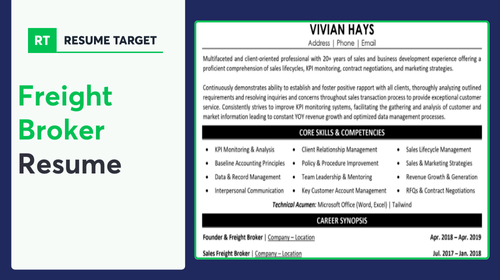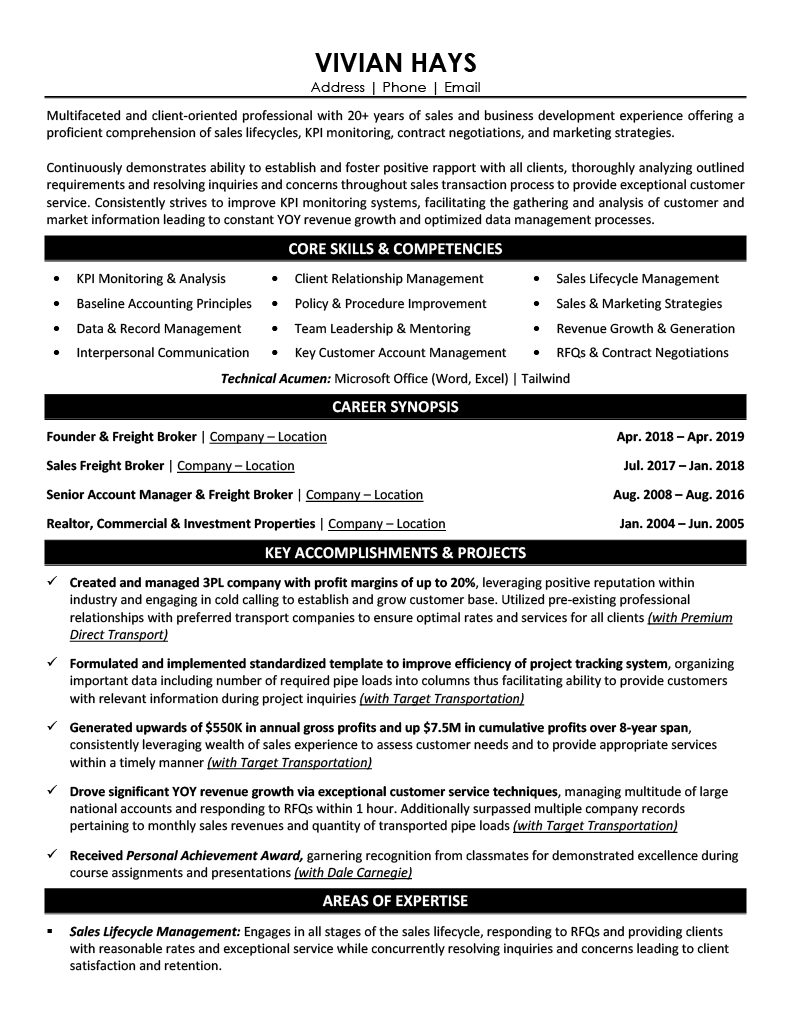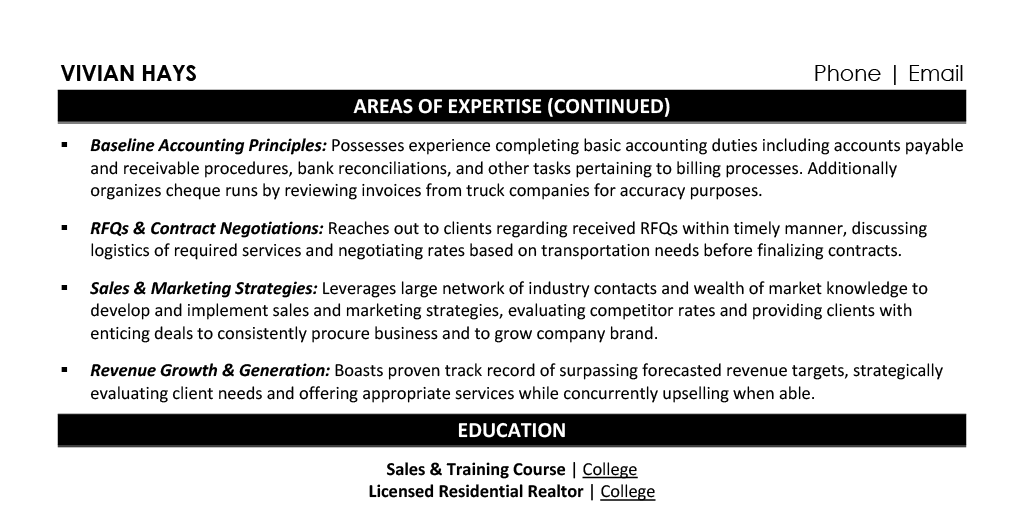

Freight brokers juggle millions in shipments daily, yet many can't effectively showcase their revenue impact on paper. Moving freight takes skill, but moving your resume to the top of the pile requires a different kind of expertise.
Are you struggling to translate your deal-making abilities into compelling resume content? Your resume needs to show both your negotiation prowess and your bottom-line results in a way that catches a hiring manager's attention.
At Resume Target, we understand how to position freight brokers as revenue-driving professionals. We help you transform complex logistics achievements and relationship-building skills into a powerful document that gets interviews.


In the complex world of logistics, freight brokers serve as the crucial connection point between businesses needing to ship goods and the carriers who transport them, requiring specialized licensing from the Federal Motor Carrier Safety Administration (FMCSA) to operate legally.
As a freight broker, you'll wear multiple hats - negotiating rates, coordinating shipments, managing documentation, and using load boards to match available trucks with waiting cargo, all while ensuring both shippers and carriers get the best possible deal.
Whether you're just starting out or looking to advance your logistics career, the freight brokerage industry offers numerous paths for growth, from specializing in specific freight types to building your own brokerage firm and managing a team of agents.
Let's talk about what makes a career as a Freight Broker so financially rewarding! Your earning potential in this dynamic field can be truly impressive, with multiple opportunities to increase your income as you gain experience. And here's what's exciting - your compensation typically includes both a base salary and performance-based commissions, giving you more control over your earning potential.
Figures from: Surety Now
Ready to climb the freight broker career ladder? From entry-level broker to owning your own brokerage firm, this dynamic field offers clear paths for advancement through experience, networking, and proven performance.
To accelerate your career growth, you'll need to master both technical expertise and relationship-building skills that go well beyond basic freight coordination.
- Transportation Management Systems (TMS) - Load Board Operations - Rate Negotiation and Pricing Strategy - Relationship Building and Network DevelopmentLaunch your freight broker career by combining a high school diploma with transportation industry experience and obtaining your freight broker license through the Federal Motor Carrier Safety Administration (FMCSA).
To build a successful career path, you'll need to develop strong training in freight broker basics, pricing, and negotiation techniques while working your way up through the industry.
Requirements from TransLogistics Inc
Struggling to showcase your logistics expertise, carrier relationships, and negotiation wins in a way that catches a hiring manager's attention? This comprehensive, section-by-section guide will walk you through creating a freight broker resume that highlights your most impressive achievements and industry knowledge.
If you're like most freight brokers, condensing years of logistics expertise, relationship building, and market knowledge into a few powerful sentences can feel as challenging as coordinating a complex multi-drop shipment.
While you excel at negotiating rates and matching carriers with shippers, translating your ability to move millions in freight revenue and maintain a robust carrier network into compelling resume language requires a different kind of strategic thinking that hiring managers need to see.
How would you describe your overall approach to building and maintaining relationships between shippers and carriers across your freight brokerage career?
Reason: This helps frame your professional identity and relationship management style, which is crucial in freight brokerage. It sets the tone for how you position yourself as a connector in the logistics industry.
What would you say are the key market segments or transportation modes where you've developed the deepest expertise as a freight broker?
Reason: This question helps you articulate your specialized knowledge areas and market focus, allowing you to craft a summary that immediately signals your value to potential employers in specific freight sectors.
How would you characterize your approach to technology and digital tools in your freight brokerage practice?
Reason: With the increasing digitization of freight brokerage, highlighting your technological adaptability and proficiency with modern logistics platforms helps position you as a forward-thinking professional in the industry.
As a freight broker, your success depends on balancing relationship-building abilities with technical logistics knowledge, making it crucial to showcase both soft and hard skills on your resume.
From negotiating rates with carriers and managing TMS software to coordinating multi-modal shipments and ensuring regulatory compliance, you'll need to demonstrate your expertise across the full spectrum of freight brokerage operations.
Showcase your logistics expertise by organizing your work history into three powerful sections: a high-level role overview that highlights your market reach, measurable achievements that demonstrate your revenue growth and carrier relationships, and core responsibilities that spotlight your operational excellence in freight management.
Many freight brokers struggle to effectively showcase their success in building carrier relationships and optimizing shipping costs amid a competitive logistics landscape. Transform your experience into compelling metrics by highlighting specific revenue growth, carrier network expansion, and cost-reduction wins that demonstrate your direct impact on bottom-line results.
A strong responsibilities section demonstrates how Freight Brokers connect shippers with carriers while managing complex logistics operations. Your role description should show hiring managers how you optimize transportation networks and deliver value through effective supply chain management.
Your freight broker credentials demonstrate your expertise in transportation logistics and compliance with federal regulations. Prioritize your most recent certifications first, especially those from recognized institutions like the Transportation Intermediaries Association (TIA) or your FMCSA licensing.
Now that you've created a strong foundation using Resume Target's proven resume writing guidelines, you're ready to transform your resume into a powerful tool for landing freight broker positions.
While many job seekers only customize their cover letters, successful freight broker professionals know that personalizing every resume is essential in today's competitive logistics industry.
By carefully aligning your resume's keywords and achievements with each job description, you'll not only sail through ATS screening systems but also demonstrate to hiring managers that you thoroughly understand their specific shipping, carrier relations, and revenue generation needs.
Ready to stand out from other freight broker candidates? Let's turn your resume into a laser-focused marketing document that proves you're the perfect match for each opportunity!
Don't let a lack of experience hold you back from launching your career as a Freight Broker!
Your path to success starts with showcasing your understanding of transportation logistics, customer service skills, and any relevant coursework or training programs you've completed.
Focus on highlighting your communication abilities, knowledge of transportation management systems, and any experience with customer relationship management.
For more detailed guidance on structuring your resume, check out the Student Resume Writing Guide to ensure you're including all the essential elements.
Your entry-level Freight Broker resume summary is your chance to showcase your logistics knowledge, customer service abilities, and relevant coursework or internship experiences.
Focus on highlighting your understanding of transportation management systems, rate negotiation skills, and any hands-on experience you've gained through academic projects or part-time work.
"Detail-oriented and customer-focused professional with foundational experience in logistics coordination and transportation management through academic projects and internship experience. Demonstrated success in route optimization simulations and freight rate analysis during coursework, complemented by strong negotiation and communication abilities. Proficient with transportation management systems (TMS) and logistics software. Seeking to leverage analytical skills and industry knowledge to excel as a Freight Broker while driving operational efficiency and building strong carrier relationships."
Now's your chance to showcase the specialized training and certifications that set you apart as a freight broker professional!
Don't just list basic credentials - highlight relevant coursework in transportation management, logistics software training, and standout projects like developing routing solutions or managing mock shipping operations that demonstrate your practical expertise.
Courses common to a degree/certification for Freight Brokers include Freight Broker Basics Course [2] and courses covering topics such as the basics of freight brokering, setting up a business, operations, transportation law, broker agreements, insurance, rate quotes, sales techniques, and negotiation skills [1].Relevant Coursework: Freight Broker Operations | Transportation Law & Regulations | Supply Chain Management | Business Operations | Rate Analysis & Pricing | Contract Negotiations
Key Projects:
Freight Route Optimization Simulation: Developed comprehensive logistics solution for a mock company requiring multi-state freight movement, resulting in 15% cost reduction and improved delivery times.
Carrier Network Development Project: Led team initiative to establish strategic partnerships with regional carriers, resulting in expanded service coverage and enhanced competitive pricing.
Leverage your educational background, internship experiences, and technical training to showcase the essential freight broker skills that employers seek, demonstrating your readiness to excel in this dynamic logistics role.
As an aspiring Freight Broker, your combination of technical knowledge and core logistics skills positions you well for success in this growing industry, where demand for talented professionals continues to expand alongside global trade developments.
Let's face it - translating your complex network of relationships, negotiation wins, and route optimization successes into compelling resume content can feel like trying to fit an oversized load through a narrow lane.
At Resume Target, we specialize in logistics industry resumes and understand exactly how to showcase your freight broker expertise, from highlighting your carrier network development to quantifying your cost-saving achievements.
With our proven track record of helping freight brokers land better opportunities, we know exactly how to position your skills in today's competitive logistics market.
Don't let peak shipping season pass you by - contact Resume Target today to transform your resume into a powerful tool that opens doors to better opportunities in the freight industry.
Impress any hiring manager with our Logistics resume writing service. We work with all career levels and types of Logistics professionals.
Learn More → Logistics Resume Writing Services